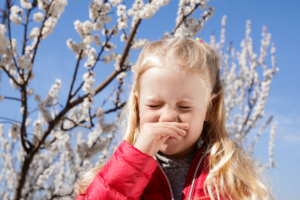
As the seasons change, many parents find themselves on high alert for signs of allergies in their children. Seasonal allergies, also known as hay fever or allergic rhinitis, can affect children just as much as adults. Now that we’re in spring season, it’s important to be able to recognize the signs of season allergies.
Identifying the symptoms early on is crucial for providing the necessary care and ensuring a better quality of life for your child. Learn from our providers what common signs may indicate your child is experiencing seasonal allergies.
Signs Your Child May Have Seasonal Allergies
- Persistent Sneezing and Runny Nose: One of the hallmark signs of seasonal allergies in children is persistent sneezing and a runny nose. If you notice that your child is frequently wiping their nose or sneezing, especially during specific seasons, it could be a clear indication of allergic rhinitis.
- Itchy or Watery Eyes: Children with seasonal allergies often experience itching and watering of the eyes. If your child frequently complains about itchy eyes or you notice them rubbing their eyes more than usual, it may be time to consider the possibility of seasonal allergies.
- Frequent Throat Clearing or Coughing: Postnasal drip caused by allergies can lead to a persistent cough or throat clearing in children. If your child seems to have a nagging cough that doesn’t seem to be associated with an illness, seasonal allergies may be the culprit.
- Fatigue and Irritability: Allergies can take a toll on a child’s energy levels, leading to fatigue and irritability. If you notice your child seeming more tired than usual or displaying increased irritability during specific seasons, it could be related to allergic reactions.
- Difficulty Sleeping: The symptoms of seasonal allergies can worsen at night, making it difficult for children to get a good night’s sleep. If your child is having trouble sleeping and exhibits other allergy symptoms, it’s essential to investigate further.
- Decreased Appetite: Allergies can affect a child’s sense of taste and smell, leading to a decreased appetite. If you observe a sudden change in your child’s eating habits, it might be worth considering whether seasonal allergies are playing a role.
- Skin Reactions: In some cases, seasonal allergies can manifest in skin reactions, such as hives or eczema. If your child develops unexplained rashes or red, itchy skin during specific seasons, it’s important to consult with a healthcare professional.
- Worsening Asthma Symptoms: For children with asthma, seasonal allergies can exacerbate respiratory symptoms. If you notice an increase in your child’s asthma symptoms during certain times of the year, it may be related to allergic triggers.
Consult with a Physician
Recognizing the signs of seasonal allergies in children is crucial for providing timely and effective interventions. If you suspect that your child may be experiencing seasonal allergies, it’s important to consult with a healthcare professional for a proper diagnosis and personalized treatment plan. Contact HealthPark Pediatrics at 919.896.7066.









